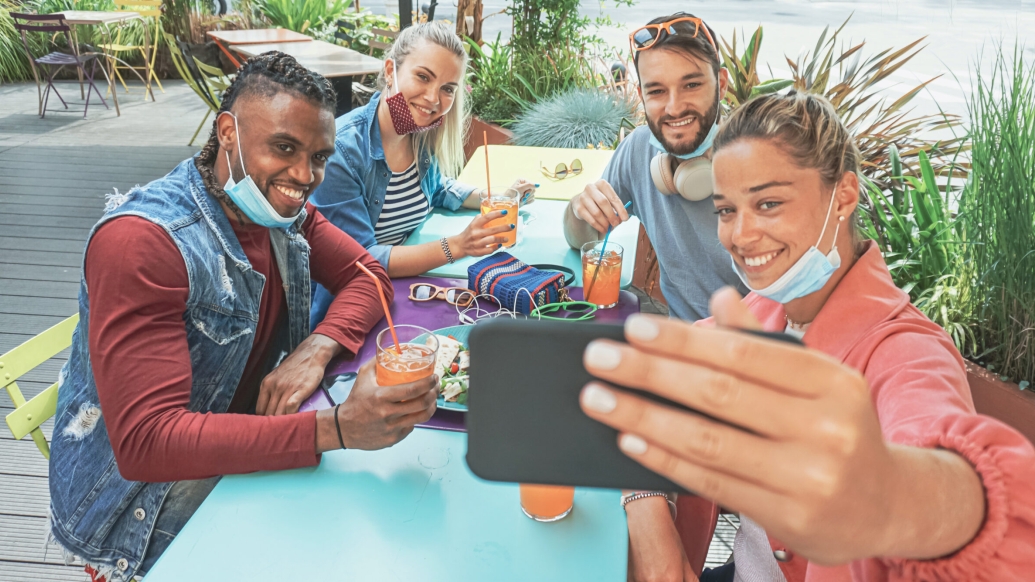While nearly all Americans use a mask at some point each week, very few consistently wear their mask during many common potentially risky activities, study shows.
10:27 AM
Author |

While nearly all Americans use a mask at some point each week, very few consistently wear their mask during many common potentially risky activities.
This is true even among adults whose older age or preexisting health conditions put them at higher risk for severe complications from COVID-19, according to a University of Michigan study.
The study, published in JAMA Network Open, was based on a national survey of Americans who reported their perceived chance of COVID-19 infection and their risk of severe consequences if infected. The study also examined whether adults with more risk factors took actions to lower their risk of contracting the disease, such as avoiding crowds, practicing social distancing and wearing masks during visits with friends or visits to grocery stores.
The researchers found that more than half of the respondents reported wearing a mask consistently in only one activity: shopping at a grocery store or pharmacy. When respondents visited friends at their homes or were within 6 feet of someone they did not live with, they much less frequently reported wearing a mask.
"We found that while wearing a mask sometime in the past week was nearly universal, persistent use was uncommon for most specific activities, including activities that were done by many adults each week," says Robert Schoeni, a research professor at the University of Michigan Institute for Social Research. "The high prevalence of mask wearing at grocery stores and pharmacies may reflect mask requirements at these businesses."
The survey, part of the University of Southern California's Understanding America Study, assessed 6,084 respondents in November and early December, just before Americans began to receive vaccines. The survey asked these participants about their activities over the past seven days, including visiting a bar or club, going to the grocery or pharmacy, visiting a friend's home or hosting visitors, participating in a gathering of 10 or more people, or being within 6 feet of a someone they did not live with, among a few other activities. The survey also asked respondents whether they wore a mask during gatherings, grocery trips or visits with friends as well as respondents' general opinions of wearing a mask.
The respondents were also asked whether they have chronic lung disease, kidney disease, heart disease, cancer, autoimmune disorder, diabetes, asthma, high blood pressure or obesity—medical conditions the Centers for Disease Control and Prevention have identified as being associated with severe illness from COVID-19.
The average age of participants was 48, and 52% of the respondents were women. Adults aged 70 and older and adults of all ages who had preexisting health conditions accurately reported a higher perceived chance of complications from the disease. But this perceived risk did not make this group more likely to wear a mask while visiting with friends or during other common activities.
Forty percent of adults reported visiting a friend's home and 42% of adults hosted visitors at their home over the past seven days, but even among adults with three or more medical risk factors, only 11% and 9% reported always wearing a mask while doing these social activities, according to the study. Sixty-four percent of adults said they had been within 6 feet of someone they did not live with, but less than a third of the adults always wore a mask while doing so.
The researchers say visiting with friends and family or being in close contact with individuals who are not members of their household increases exposure to the virus, but its contribution to overall spread of the virus remains unknown. However, contact tracing evidence from Maryland in July showed that 44% of infected patients had attended a family gathering.
"Family gatherings may be difficult settings in which to wear masks and ask others to do so as well. The low prevalence of mask wearing in small gatherings may indicate the role of social networks and peers in influencing behavior," Schoeni says.
"We need to better understand why so many people, even those at a higher risk for complications, do not wear masks consistently when in these settings and trace their choices as more Americans become vaccinated. Such evidence is necessary to inform the development of strategies to improve mask wearing during these common activities."
In addition to Schoeni, who is also a professor of economics and public policy and a faculty member of the Institute for Healthcare Policy and Innovation, researchers include: Kenneth Langa of the U-M Medical School and IHPI, and a member of the faculty at ISR and the School of Public Health; Emily Wiemers of Syracuse University; and Judith Seltzer of the University of California, Los Angeles.
Paper cited: "Association Between Risk Factors for Complications From COVID-19, Perceived Chances of Infection and Complications, and Protective Behavior in the US," JAMA Netw Open. DOI: 10.1001/jamanetworkopen.2021.3984

Explore a variety of healthcare news & stories by visiting the Health Lab home page for more articles.

Department of Communication at Michigan Medicine
Want top health & research news weekly? Sign up for Health Lab’s newsletters today!





